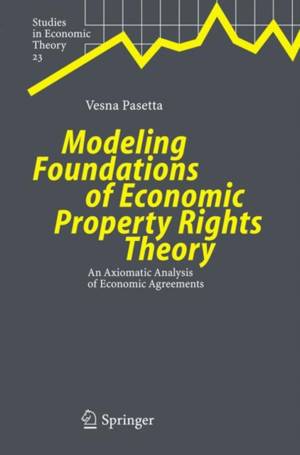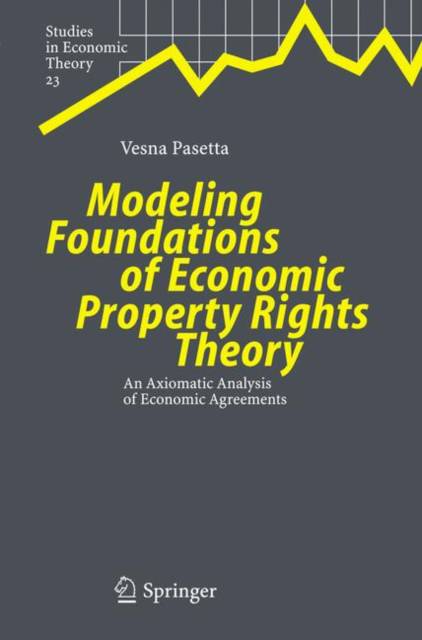
Bedankt voor het vertrouwen het afgelopen jaar! Om jou te bedanken bieden we GRATIS verzending (in België) aan op alles gedurende de hele maand januari.
- Afhalen na 1 uur in een winkel met voorraad
- In januari gratis thuislevering in België
- Ruim aanbod met 7 miljoen producten
Bedankt voor het vertrouwen het afgelopen jaar! Om jou te bedanken bieden we GRATIS verzending (in België) aan op alles gedurende de hele maand januari.
- Afhalen na 1 uur in een winkel met voorraad
- In januari gratis thuislevering in België
- Ruim aanbod met 7 miljoen producten
Zoeken
Modeling Foundations of Economic Property Rights Theory
An Axiomatic Analysis of Economic Agreements
Vesna Pasetta
€ 181,95
+ 363 punten
Uitvoering
Omschrijving
This is an introduction to the foundations of economic property rights t- ory (EPRT). In this volume, a ?rst step in the EPRT research program, rules concerningeconomicpropertyrights(e. p. r. s), entrepreneurialagreements, and enterprises are discussed. Introduced concept of e. p. r. s is an extension of the traditional concept of pairing of residual rights of control and residual rights of returns in the economic theory. Its importance in economics is generated fromageneralimpossibilityofmakingacompletecontract, concerninge. p. r. s, for any nontrivial economic transaction. The volume o?ers a theoretical - tension of mathematical economics, applying recent results of Hopf algebras, quasi-Hopf algebras, representation theory, theory of categories, and defor- tion theories, in looking for suitable mathematical methodology of economic property rights theories and foundations of general theory of economic agr- ments. The idea is to construct a kind of mathematical application in which any fundamental formal entity and/or operation has an empirical economic interpretation. This approach is seen as a way to cope with an extreme c- plexity of economic phenomena under consideration and requests for precise formulationofmodelswheremeaningfulanswersandsolutionsofproblemsare only those which are obtained rigorously. The proposed extensions in ma- ematical economics and property rights theory are to provide rich enough foundations to follow complexity of economic property rights in the exact way, and to identify where there is an appropriate method providing a- quate solution, and also to ?nd problems where in general there is no such methodology.
Specificaties
Betrokkenen
- Auteur(s):
- Uitgeverij:
Inhoud
- Aantal bladzijden:
- 232
- Taal:
- Engels
- Reeks:
- Reeksnummer:
- nr. 23
Eigenschappen
- Productcode (EAN):
- 9783642063909
- Verschijningsdatum:
- 21/10/2010
- Uitvoering:
- Paperback
- Formaat:
- Trade paperback (VS)
- Afmetingen:
- 156 mm x 234 mm
- Gewicht:
- 362 g

Alleen bij Standaard Boekhandel
+ 363 punten op je klantenkaart van Standaard Boekhandel
Beoordelingen
We publiceren alleen reviews die voldoen aan de voorwaarden voor reviews. Bekijk onze voorwaarden voor reviews.









